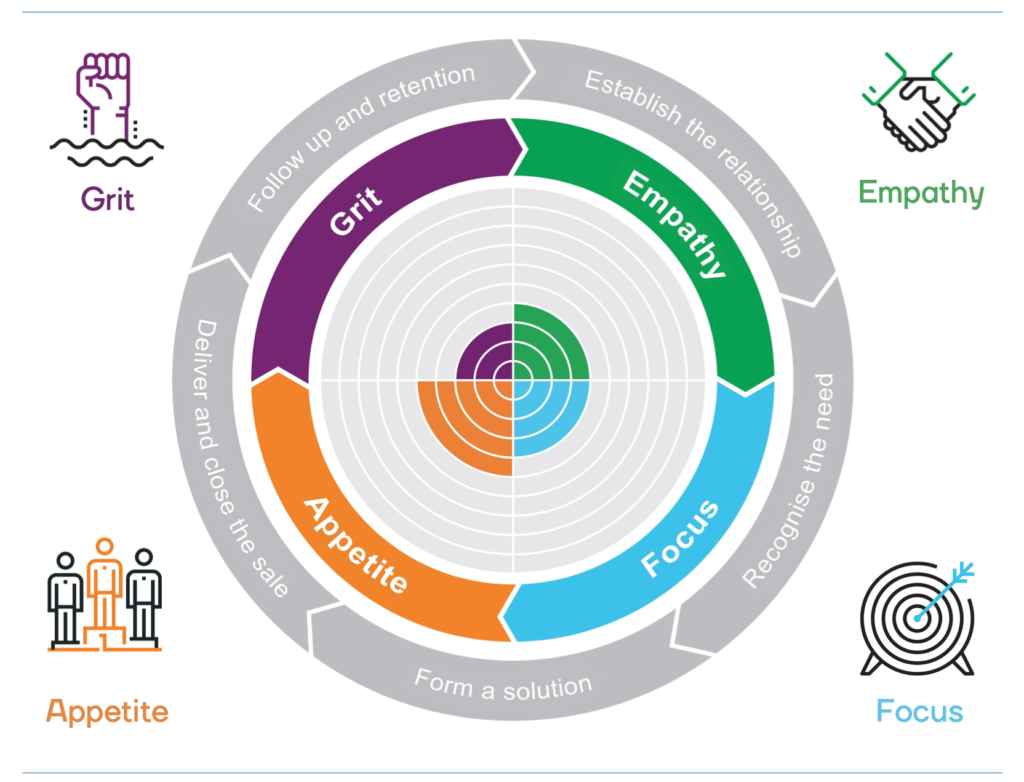
In order to know how to retain your top sales talent, understanding why individuals depart is crucial. Numerous factors contribute, but the main ones tend to always include:
Poor management:
Managers wield significant influence. One Gallup study on workplace engagement in the US revealed that half of American adults have left jobs due to bad management. Sales representatives, being goal-driven, require managers aligned with their vision. Without trustworthy leadership, sales reps lose momentum and may seek organisations with more inspiring (or just better) management.
Bad onboarding experience:
Tenure is a crucial indicator. A 2019 report from the Work Institute showed that as many as 38% of employees leave within the first year, with 43% departing within the first 90 days. A structured onboarding experience is paramount, enhancing the connection to the business’s mission. Without it, new hires may feel adrift, affecting team cohesion and their confidence to excel.
Low engagement:
The global pandemic reshaped sales teams’ dynamics, moving interactions from in-person to remote channels. Increased administrative tasks reduced time spent on actual selling, impacting engagement. According to Salesforce, sales professionals spending at least four hours on selling activities reported higher job satisfaction. Reduced time doing what they love affects engagement, particularly for sales teams.
The impact of sales churn
Elevated turnover rates in sales teams can have a massive impact across an organisation, leading to numerous negative consequences:
Increased recruitment & training costs:
The HR department shoulders increased responsibilities, from crafting job ads to training sessions. Increased staff turnover necessitates extensive efforts (particularly for HR teams), and escalating costs.
Lower customer satisfaction:
Sales reps will often build relationships that are key to customer loyalty. A revolving door of salespeople disrupts these connections, leading to dissatisfaction and potential loss of clientele.
Lost revenue:
A departing salesperson takes not only skills but valuable connections. Recovering from the loss of your top sales people can take years. The financial impact encompasses lost revenue, recruitment costs, and missed opportunities.
How to retain sales talent
Set clear goals & expectations:
Define team goals, individual role expectations, and quotas. Regular communication ensures alignment, removing ambiguity and helping to develop better confidence in team members.
Listen to your sales team:
Constructive feedback channels are essential. Try to create an environment where you encourage sales reps to voice their concerns. This will foster better employee engagement and help grow a sense of value within the organisation. Often your sales team will be the first people to hear reasons as to why you did or didn’t win certain business – listening to them can help you improve your product and provide better services.
Hire sales reps with the right personality traits:
A proactive approach to talent acquisition is crucial. Identify and hire individuals with the personality traits that align with success in sales roles. Seek qualities such as resilience, excellent communication skills, and a results-driven mindset. A well-aligned team not only enhances overall performance but also contributes to a positive and collaborative work environment, reducing the likelihood of turnover.
Implement a robust onboarding process:
Beyond the initial recruitment phase, a comprehensive onboarding process plays a pivotal role in retaining sales talent. Ensure new hires are introduced to the organisational culture, values, and mission. Provide structured training programs to familiarise them with tools, processes, and the expectations of their role. A smooth employee onboarding experience not only accelerates the integration of new team members but also instils confidence, reducing the chances of early exits.
Use sales-focused psychometric tests
To make informed hiring decisions and understand the strengths and weaknesses of sales candidates, leverage psychometric assessments tailored for sales roles. These assessments delve into personality traits, communication styles, and problem-solving approaches, offering valuable insights. By aligning individual traits with the needs of your sales team, organisations can build a more resilient and cohesive sales team, ultimately enhancing retention rates and increasing revenue.
The solution: The Clevry Sales Report
In the pursuit of building a high-performing sales team, leveraging the insights from psychometric tools such as the Clevry Sales Report is key.
This invaluable tool offers penetrating insights into candidates’ sales potential including values, motivational drivers, and personal styles that are instrumental for success in sales roles.
By unveiling potential de-railers, the Sales Report equips line managers and recruitment teams with a comprehensive understanding of each candidate’s potential contributions to sales.
The summary page provides a quick overview of a candidate’s sales potential, while the detailed Sales Strengths section delves into specific scores for each quadrant, offering a nuanced evaluation.
For a firsthand experience of the transformative power of the Clevry platform, we invite you to download a sample report today and see how we can help you take your hiring decisions to new heights.

Sources:
https://www.gallup.com/workplace/236570/employees-lot-managers.aspx
https://www.salesforce.com/resources/research-reports/state-of-sales/



